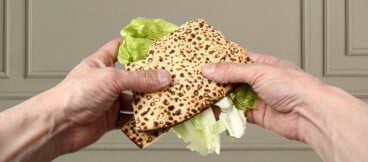Amidst the horror and destruction that defined the Kovno Ghetto, there stood a beacon of light. In the form of a human, that light was Reb Elchonon Wasserman. As the people tried to make sense of the nightmare that had become their reality, Reb Elchonon offered hope, strength, and solace. Prior to his being taken into custody (and ultimate murder), Reb Elchonon told over the following parable, helping to give perspective to the atrocities which the people were living through.
A man unfamiliar with agriculture once came to a field. Seeing a farmer there, he asked if he could stand by and observe the agricultural process as it unfolded. The farmer kindly consented to his request.
As time went on, however, the visitor developed a deep distaste for his host. From the distribution of golden wheat kernels across a muddy plain, to the overturning of beautiful lush greenery (plowing), and finally, sticking a perfectly formed block of dough into an oven to burn – the man was horrified at the farmer’s seeming penchant for destruction.
However, when the farmer removed the loaf of bread from the oven, placing it on a plate in front of the man and inviting him to eat, the man finally understood. Every step of the process had indeed been necessary.
Reb Elchonon explained: we are similar to the above man. We are still in middle of the process – it is impossible to understand what appears to us as pain and destruction. However, at the end of it all, with Mashiach’s coming; then, everything will make sense. Until then, we simply must have faith that this too is necessary for our ultimate good.
Every year, on Pesach, we thank Hashem once again for releasing us from the bondage of Mitzrayim. Understanding that without Hashem’s intervention we would still be slaves to Pharaoh, it reasons that we should be eternally grateful for our redemption. However, it isn’t as clear-cut as that.
The Jewish nation wasn’t native to Mitzrayim. Hashem had sent us down to Mitzrayim from Eretz Yisroel and arranged for the entire painful saga to take place. It’s difficult to thank someone for extricating you from a bad situation when they were the one that got you entangled in the first place. Why was this different?
Reb Moshe Feinstein explains, that Klal Yisroel as a nation had a mission to accomplish. That being, to be the Am Hanivchar – the chosen people. To live by a higher standard – the Torah standard. Only after living through the horrors of Mitzrayim, observing the deplorable conduct of a sophisticated and cultured superpower; would Klal Yisroel be able to fulfill this mission. To realize the necessity of Torah – that without its guidance man can sink to the lowest depths of depravity.
True, galus Mitzrayim was terribly painful. But it was also absolutely necessary. Without it, we never could have become who we are – The Jewish nation; an eternal people.
When we thank Hashem for taking us out of Mitzrayim we aren’t only being grateful for our redemption. We are gratefulfor our enslavement; thankful for the opportunity that we had to develop as a nation – as Klal Yisroel.
Sometimes, in our own lives, circumstances don’t work out exactly the way we’d like them to. People undergo frustrating experiences; trying experiences; painful experiences. Not always is it easy to see a silver lining amid the dark clouds.
And sometimes, a silver lining isn’t visible. For most of the time in Mitzrayim, the Jews experience was not understandable. In Reb Elchonon’s time, what was happening didn’t make sense. For us, still mired in galus, there is so much that we cannot comprehend. But we believe. That not only can we survive this painful episode, but that we can emerge stronger.
When the Beis Hamikdash stood, Hillel would take a korban Pesach, maror, and matza, and place them together in a sandwich. He didn’t make that sandwich for culinary purposes. There was tremendous symbolism attached to it. Hillel’s sandwich was illustrating the above.
Wrapping the bitterness together with the freedom, Hillel’s כורך held a lesson for the ages. We don’t go on despite our suffering – we become who we are because of it.
In our times, the korban Pesach may not be a part of thesandwich we eat. But the lesson it symbolized remains as true as ever. Life will always present challenges, hurdles and obstacles that are difficult to navigate. כורך reminds us that suffering isn’t simply followed by redemption – it goes together with it.
And when in our lives, the sun breaks through the clouds, chasing away the darkness of overcast skies; כורך will finally be complete. With Mashiach’s arrival, korban Pesach will once again be a part of the sandwich we eat – and we will finally understand why we had to undergo the bitterness of galus. At that time, everything will all come together.











